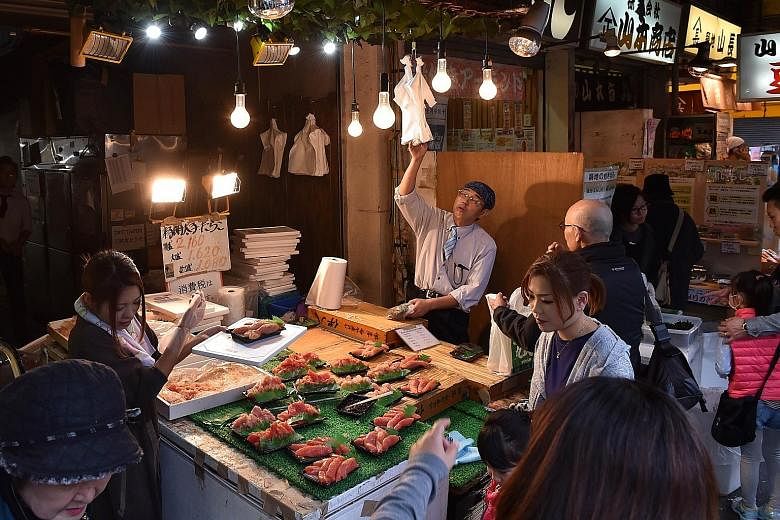TOKYO • Japan's economy slipped into recession for the second
time since Prime Minister Shinzo Abe came to power nearly three years ago, data showed yesterday, dealing a fresh blow to his drive to kickstart weak growth and end years of deflation.
Mr Abe has staked his reputation on a policy blitz of fiscal spending, aggressive monetary policy easing and structural reforms - dubbed Abenomics - aimed at reviving the world's third-largest economy
Japan's economy, once Asia's biggest, has been overtaken by giant neighbour China in size, while it struggles with a challenging demographic outlook that is expected to see its population shrink by the tens of millions in coming decades.
Still, it boasts some of the world's biggest companies, including in the automotive sector and banks, and its domestic technology plays a key role in a wide array of global industries, including vehicles, electronics and high-end machinery.
The Cabinet Office yesterday said gross domestic product shrank 0.2 per cent in the July-September period, or an annualised contraction of 0.8 per cent, marking the second straight quarterly decline - considered a technical recession. It was also below the 0.1 per cent forecast in a Bloomberg News survey.
The economy contracted last year after consumers tightened their belts following an increase in the country's consumption tax, which put a dent in a nascent recovery. That downturn spurred the Bank of Japan to sharply increase its already massive bond-buying programme, effectively printing money to spur lending.
But the government slightly improved its April-June data to a 0.2 per cent contraction from 0.3 per cent shrinkage previously estimated.
The latest figures will turn attention back to the Bank of Japan ahead of a policy meeting this week to see whether it adds to its 80 trillion yen (S$929 billion) annual stimulus programme.
The data offers a fuzzy snapshot of the Japanese economy, with improving consumption countered by weakening corporate investment caused by uncertainty over the global outlook, particularly China, experts said.
"The real economy is at a standstill, even though other aspects of 'Abenomics' - corporate earnings and stock prices - are improving," Mr Taro Saito, director of economic research at NLI Research Institute, told Agence France-Presse.
Mr Akira Amari, the government minister in charge of revitalising the economy, put a largely positive spin on the result, saying in a statement that the "business climate is expected to recover gradually", citing rising wages as a bright factor. But he voiced frustration against businesses that have shied away from making fresh investment.
"Having made record profits, with their equipment becoming older, what kind of business decision is it to still forgo investment?" Mr Amari told a news conference.
Analysts broadly expect the economy to pick up in coming quarters, with the central bank seen further loosening monetary policy and Mr Abe tipped to unveil fresh stimulus.
"Details are not as bad as the figures might suggest," economist Junichi Makino at SMBC Nikko Securities said, citing declines in inventories and increasing imports.
For technical reasons those results negatively affect GDP but can actually imply increasing demand. But Mr Marcel Thieliant, economist at Capital Economics, said any recovery should be viewed with caution. "Looking ahead, the economy should start to recover this quarter, but we think that growth in the current fiscal year will be closer to 0.5 per cent rather than the 1.2 per cent projected by the Bank of Japan at its end-October meeting," he wrote.
AGENCE FRANCE-PRESSE

